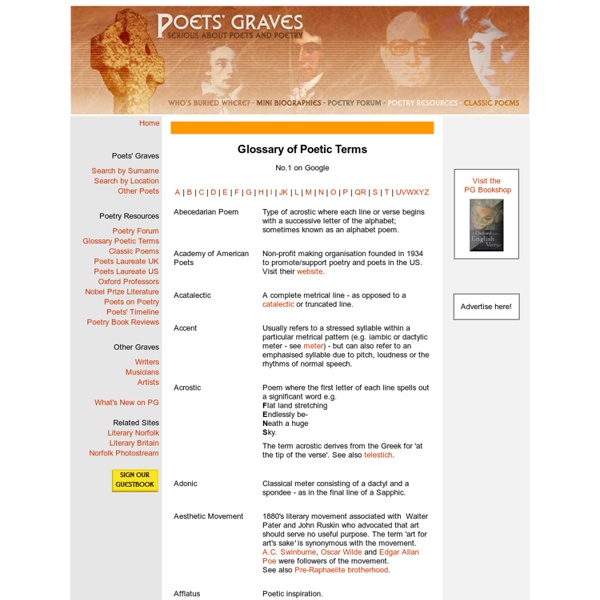For Educators
The Academy of American Poets presents lesson plans that align with Common Core Standards, each of which have been prepared by a curriculum specialist concerned with developing skills of perception and imagination. We hope they will inspire the educators in our community to bring even more poems into your classrooms! "The Owl" by Arthur Sze The classroom component of this year’s National Poetry Month’s education project, Poet-to-Poet, for grades 3 to 6. From "Manatee/Humanity" by Anne Waldman The classroom component of this year’s National Poetry Month’s education project, Poet-to-Poet, for grades 7 to 12.
The Sonnets
You can buy the Arden text of these sonnets from the Amazon.com online bookstore: Shakespeare's Sonnets (Arden Shakespeare: Third Series) I. FROM fairest creatures we desire increase,II.
Alliteration, assonance, emotive language, colloquial, slang, jargon, neologism, cliché, rhetorical questions, Required skills and knowledge - language features and techniques, Skills by mode: reading and writing, English Skills Year 9, NSW
Alliteration Alliteration is the repetition of consonant sounds at the start of a word: Alliteration is used to link two or more words (and ideas) together. You will usually find examples of alliteration in poetry.
Writing About Poetry
Summary: This section covers the basics of how to write about poetry. Including why it is done, what you should know, and what you can write about. Contributors:Purdue OWLLast Edited: 2010-04-21 08:27:54 Writing about poetry can be one of the most demanding tasks that many students face in a literature class. Poetry, by its very nature, makes demands on a writer who attempts to analyze it that other forms of literature do not.
Poetry 180: A Poem a Day for American High Schools (Poetry and Literature Center, Library of Congress)
Welcome to Poetry 180. Poetry can and should be an important part of our daily lives. Poems can inspire and make us think about what it means to be a member of the human race.
Glossary of Poetic Terms from BOB'S BYWAY
featuring: Phonetic pronunciation Cross references
10 poems to read during National Poetry Month
In honor of National Poetry Day, TED-Ed asked writing teachers at the San Francisco Writers Grotto to recommend their favorite poems worth sharing. Below, a short poetry reading list for TED-Ed learners of all ages. Constance Hale, author of Sin and Syntax: How to Craft Wickedly Effective Prose, recommends:
Teaching Sonnets Unit Plan
Many educators have found that the sonnets are a wonderful way to introduce Shakespeare to students because the smaller blocks of language are less intimidating than whole plays. Louisa Newlin, who leads workshops on sonnets for teachers, and Gigi Bradford, who teaches Shakespeare’s Sisters, a seminar for high school students at the Folger, have created a series of lesson plans about the sonnets that concentrate on the Bard but also include sonnets from before Shakespeare as well as contemporary sonnets. This arc of study provides a context for Shakespeare’s genius, introduces the sonnet’s form and structure, includes language easier to understand than Shakespeare’s, and illustrates his continuing influence. It’s both a lot of fun and a good way to show that sonnets are ways of thinking, not just love poems in archaic language.



